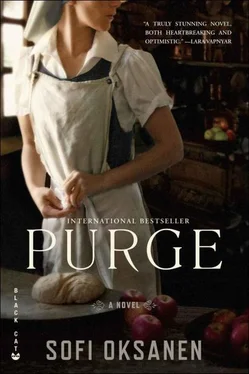“And I won’t let them come back to frighten my little mushroom.”
Aliide walked to Ingel’s house, stopped under the silver willow on the path into the yard, heard dogs and sparrows, the murmur of a peculiar, early spring, and drew the moistness of the soil inside her. How could she leave such a place? Never, she couldn’t do that. This soil was her soil, this was where she came from and where she would stay, she would never leave here, she would never give it up, not this. Not Hans and not this. Had she really wanted to escape when she had the chance? Did she really stay because she had promised Hans she would take care of Ingel?
She kicked at the shoulder of the road. The edge gave way. Her edge.
She went away from the fence that surrounded the yard; the bare branches of her home birches hung down. Linda was in the yard, playing and singing:
Old man, old man, threescore and six,
With just a tooth and a half that rattles and clicks,
Afraid of a mouse, afraid of a rat,
Afraid of what’s in the corner, an old flour sack.
Linda saw her. Aliide stopped. The song broke off. Linda’s eyes stared her down-big, cold, bog eyes. Aliide went back to the village road.
Afraid of a mouse, afraid of a rat.
In the evening Martin wouldn’t tell her his plans; he just said that tomorrow everything would be taken care of. Three days left. Martin ordered Aliide to remain calm. She couldn’t sleep.
A black grouse started gurgling and courting before the sun came up.
The trip to the town hall still felt like walking along the blade of an ax. As Aliide pulled on the handle of the door, she suddenly remembered how she had once frozen her tongue to metal. She didn’t remember the exact situation, just the feeling of her tongue in that icy sharpness. Maybe it was an ax. She didn’t remember how she had got free or what had happened, but she felt the same feeling in her tongue now when she stepped inside, straight into Martin’s waiting arms, and was handed a pen and a piece of paper. She understood immediately. She had to sign her own name to a testimony so strong that no return would be possible, ever again.
She smelled cold liquor, and Martin’s herringbone coat swarmed in her vision. A dog barked somewhere, a crow cawed outside the window, a spider walked up the edge of the table leg. Martin smashed it and rubbed it into the floorboards.
Aliide Truu signed the document.
Martin patted her once or twice.
He had to stay there to take care of the rest of the business. Aliide went home alone, although he had said that she could wait there for him to finish his work. She didn’t want to, but she didn’t want to go home, either-to walk across the Roosipuus’ yard, walk into the Roosipuus’ kitchen, where the conversation would break off as soon as she opened the door. They would toss a few words of Russian at her, and although the meaning would be polite, they would sound mocking. The boy would stick out his tongue from behind the cupboard, and her tea tin would hiss with the salt that they had thrown in it.
She stopped at the side of the road and looked at the peaceful landscape. Ingel would be going to do the evening milking soon. Hans might be reading the paper in his tiny room. Aliide’s hands didn’t tremble. A sudden, shameful joy spread through her chest. She was alive. She survived. Her name wasn’t on the lists. No one could bear false witness against her, not against Martin’s wife, but she could send the Roosipuus to where Estonian soil was just a faraway memory. Aliide felt her footsteps lengthen, her feet hitting the ground with strength, and she waltzed up to the Roosipuus’ house, almost knocked the mama down, went past her, and slammed the door in her face. She made herself some tea from the Roosipuus’ tin, took some sugar from the Roosipuus’ sugar bowl, and broke off half of their bread to bring with her into her room. On the threshold she turned around and told them that she was going to give them some friendly advice, because she was a gentle person and wanted only what was best for all her comrades. If they were wise, they would take down the picture of Jesus from the bedroom wall. Comrade Stalin wouldn’t like it if the workers of the new world repaid his good work with that sort of thing on their walls. The next day the print of the Son of God had disappeared.
Four days. Then just three. Both days Aliide had said she was coming over to Ingel’s house, but she hadn’t gone.
A clever cat with cunning eyes sat on a stump in the woods.
A pipe in his mouth and a cane in his hand…
Two days. Three nights.
Asked the children to read if they could,
and those of them who couldn’t read,
they all got pulled by the hair,
and those who could, and understood,
were petted and treated fair.
Not one day. Not one night.
Läänemaa, Estonian Soviet Socialist Republic
Hans Doesn’t Strike Aliide, Although He Could Have
A wind blew from where the little birds were perched in the bare birch trees. There was a buzzing in Aliide’s head as though she hadn’t slept for ten nights straight. When she came to the front door, she shut her eyes and strode ahead blind, groped for the handle, knocked down the saw that was hanging on the wall, went inside, and opened her eyes in the darkness.
The cupboard in front of Hans’s little room was still there.
It was only then that her heart began to race, her dry lower lip split, blood spurted into her mouth, her sweaty fingers slipped against the side of the cupboard, and she heard sounds now and then that belonged in the kitchen: Ingel’s footsteps, Linda’s cough, the clatter of a cup, Lipsi’s paws on the floor. The cupboard didn’t want to move; she had to push against it with her shoulder and hip, and it creaked, a complaint that echoed loudly through the empty house. Aliide stopped to listen. The silence crackled. The noises she had imagined in the kitchen were immediately silenced when she stopped moving. You could already see signs on the floorboards that the cupboard was always being moved. That ought to be covered up. There was something under the legs of the cupboard. Aliide bent over to look. Wedges. Two wedges. To keep it from swaying. When had Ingel put them there? Aliide removed them. The cupboard moved smoothly away from the wall.
“Hans, it’s me.”
Aliide tried to pull open the door of the chamber, but her sweaty hand slipped when she reached for the little hole they’d made to hold on to.
“Hans, can you hear me?”
There was no sound.
“Hans, help me. Push on the door. I can’t open it.”
Aliide knocked on the door, then pounded on it with her fists.
“Hans! Say something!”
A rooster crowed somewhere far off. Aliide startled, panicked, pummeled the door. She felt a pain in her knuckles that reached all the way to the soles of her feet. The wall swayed, but the silence persisted. Finally she went to the kitchen for a knife, shoved it into the crack of the door, and got hold of the edge of the trim. She yanked open the door. Hans was huddled in a corner of the cell, motionless, his head on his knees. It wasn’t until Aliide touched him that he raised his head. Only when she had asked him three times to come out did he stagger into the kitchen. And only when she asked what had happened did he speak.
“They took them away.”
That silence. The kind you don’t hear in a house in the countryside in the middle of the day. Nothing but the scratch of a mouse in the corner. They stood in the middle of the kitchen and there was a hum inside them and their breath rasped in the silence and Aliide had to sit down and put her own head on her knees, because she couldn’t bear to look at Hans’s face, covered with a night of weeping.
Читать дальше












